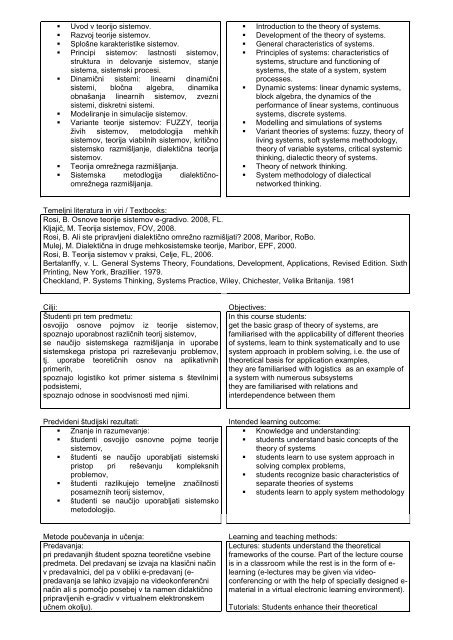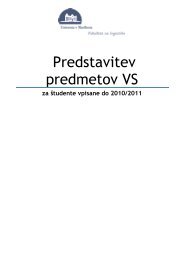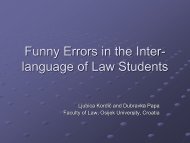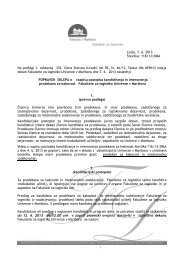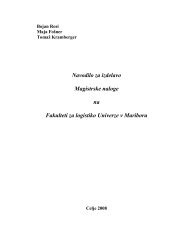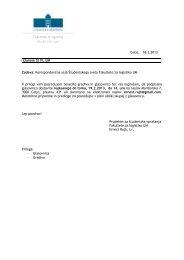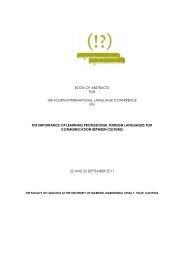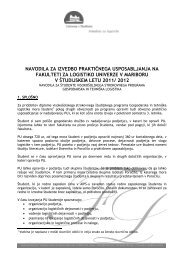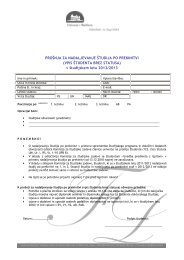Subject specification - Fakulteta za logistiko - Univerza v Mariboru
Subject specification - Fakulteta za logistiko - Univerza v Mariboru
Subject specification - Fakulteta za logistiko - Univerza v Mariboru
You also want an ePaper? Increase the reach of your titles
YUMPU automatically turns print PDFs into web optimized ePapers that Google loves.
• Uvod v teorijo sistemov.<br />
• Razvoj teorije sistemov.<br />
• Splošne karakteristike sistemov.<br />
• Principi sistemov: lastnosti sistemov,<br />
struktura in delovanje sistemov, stanje<br />
sistema, sistemski procesi.<br />
• Dinamični sistemi: linearni dinamični<br />
sistemi, bločna algebra, dinamika<br />
obnašanja linearnih sistemov, zvezni<br />
sistemi, diskretni sistemi.<br />
• Modeliranje in simulacije sistemov.<br />
• Variante teorije sistemov: FUZZY, teorija<br />
ţivih sistemov, metodologija mehkih<br />
sistemov, teorija viabilnih sistemov, kritično<br />
sistemsko razmišljanje, dialektična teorija<br />
sistemov.<br />
• Teorija omreţnega razmišljanja.<br />
• Sistemska metodlogija dialektičnoomreţnega<br />
razmišljanja.<br />
• • Introduction to the theory of systems.<br />
• Development of the theory of systems.<br />
• General characteristics of systems.<br />
• Principles of systems: characteristics of<br />
systems, structure and functioning of<br />
systems, the state of a system, system<br />
processes.<br />
• Dynamic systems: linear dynamic systems,<br />
block algebra, the dynamics of the<br />
performance of linear systems, continuous<br />
systems, discrete systems.<br />
• Modelling and simulations of systems<br />
• Variant theories of systems: fuzzy, theory of<br />
living systems, soft systems methodology,<br />
theory of variable systems, critical systemic<br />
thinking, dialectic theory of systems.<br />
• Theory of network thinking.<br />
• System methodology of dialectical<br />
networked thinking.<br />
Temeljni literatura in viri / Textbooks:<br />
Rosi, B. Osnove teorije sistemov e-gradivo. 2008, FL.<br />
Kljajič, M. Teorija sistemov, FOV, 2008.<br />
Rosi, B. Ali ste pripravljeni dialektično omreţno razmišljati? 2008, Maribor, RoBo.<br />
Mulej, M. Dialektična in druge mehkosistemske teorije, Maribor, EPF, 2000.<br />
Rosi, B. Teorija sistemov v praksi, Celje, FL, 2006.<br />
Bertalanffy, v. L. General Systems Theory, Foundations, Development, Applications, Revised Edition. Sixth<br />
Printing, New York, Brazillier. 1979.<br />
Checkland, P. Systems Thinking, Systems Practice, Wiley, Chichester, Velika Britanija. 1981<br />
Cilji:<br />
Študenti pri tem predmetu:<br />
osvojijo osnove pojmov iz teorije sistemov,<br />
spoznajo uporabnost različnih teorij sistemov,<br />
se naučijo sistemskega razmišljanja in uporabe<br />
sistemskega pristopa pri razreševanju problemov,<br />
tj. uporabe teoretičnih osnov na aplikativnih<br />
primerih,<br />
spoznajo <strong>logistiko</strong> kot primer sistema s številnimi<br />
podsistemi,<br />
spoznajo odnose in soodvisnosti med njimi.<br />
Objectives:<br />
In this course students:<br />
get the basic grasp of theory of systems, are<br />
familiarised with the applicability of different theories<br />
of systems, learn to think systematically and to use<br />
system approach in problem solving, i.e. the use of<br />
theoretical basis for application examples,<br />
they are familiarised with logistics as an example of<br />
a system with numerous subsystems<br />
they are familiarised with relations and<br />
interdependence between them<br />
Predvideni študijski rezultati:<br />
• Znanje in razumevanje:<br />
• študenti osvojijo osnovne pojme teorije<br />
sistemov,<br />
• študenti se naučijo uporabljati sistemski<br />
pristop pri reševanju kompleksnih<br />
problemov,<br />
• študenti razlikujejo temeljne značilnosti<br />
posameznih teorij sistemov,<br />
• študenti se naučijo uporabljati sistemsko<br />
metodologijo.<br />
Intended learning outcome:<br />
• • Knowledge and understanding:<br />
• students understand basic concepts of the<br />
theory of systems<br />
• students learn to use system approach in<br />
solving complex problems,<br />
• students recognize basic characteristics of<br />
separate theories of systems<br />
• students learn to apply system methodology<br />
Metode poučevanja in učenja:<br />
Predavanja:<br />
pri predavanjih študent spozna teoretične vsebine<br />
predmeta. Del predavanj se izvaja na klasični način<br />
v predavalnici, del pa v obliki e-predavanj (epredavanja<br />
se lahko izvajajo na videokonferenčni<br />
način ali s pomočjo posebej v ta namen didaktično<br />
pripravljenih e-gradiv v virtualnem elektronskem<br />
učnem okolju).<br />
Learning and teaching methods:<br />
Lectures: students understand the theoretical<br />
frameworks of the course. Part of the lecture course<br />
is in a classroom while the rest is in the form of e-<br />
learning (e-lectures may be given via videoconferencing<br />
or with the help of specially designed e-<br />
material in a virtual electronic learning environment).<br />
Tutorials: Students enhance their theoretical


